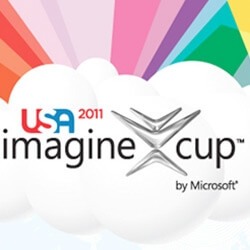News
For the Microsoft-sponsored student technology competition, Imagine Cup 2011, a team including Harvard College students was among the finalists.
A team comprising undergraduate students from Harvard, the University of Pennsylvania, and Central Connecticut State University is among 10 U.S.-based software design team finalists for the 2011 Imagine Cup.
Dubbed TTHV, the group includes Alexander Ryu, University of Pennsylvania; Annemarie Ryu '13 and Brandon Liu '14, both of Harvard College; and David Amenta, Central Connecticut State University.
For the Microsoft-sponsored student technology competition, the students developed Remindavax, a health care solution that improves patient attendance for maternal and child health care as well as helping community health workers organize their village visits to ensure patients who cannot access the health centers get needed care.
S.V. Subramanian, Associate Professor of Society, Human Development and Health; Anuraj H. Shankar, Senior Research Scientist; and Wafaie W. Fawzi, Professor of Nutrition and Epidemiology are serving as mentors. All are based at the Harvard School of Public Health.
By being among the U.S. finalists for the Imagine Cup 2011, TTHV will take part in the U.S. Finals in Seattle from April 8 to 11 and then have the chance to go on to represent the United States in the global competition in New York City from July 8 to 13, 2011.
In the meantime, as part of the Imagine Cup People’s Choice Awards, colleagues and friends can support the team by “liking” them on Facebook or voting via mobile web or SMS. Any user can vote once per day, per platform. The voting runs from March 23 to April 9.
There will be special awards to the Software Design project and the Game Design project that gain the most Facebook votes.
##
About the 2011 Imagine Cup
The Imagine Cup is the world’s premier student technology competition that challenges students to build life-changing projects that can ultimately transform the world. Microsoft created the competition nine years ago as a way to highlight and recognize student innovation around the globe, as well as inspire more young minds to study technology. Each year, the projects have become more inspirational and impactful. Students who participate gain real-world skills that help them in school, in their careers or even as they commercialize their projects, all while tackling global problems.
This year, a number of teams focused on projects that help people become better global citizens, while several teams addressed environmental issues such as clean water. One team created an automated system to better track the progression of a skin lesion as a way to eradicate skin cancer. Another team designed a strategic educational game where the player becomes a city planner tasked with providing a sustainable level of energy to the city while maintaining a pristine environment. When you consider the number of people that could be positively impacted by the implementation of any one of these projects, it is even more inspiring. These students can truly change the world.
For more information contact: Edwin Guarin, Sr. Academic Developer Evangelist, edwin.guarin@microsoft.com.
Topics: Computer Science
Cutting-edge science delivered direct to your inbox.
Join the Harvard SEAS mailing list.



